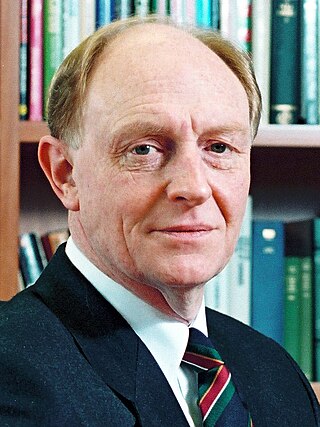Related Research Articles

Angela Evans Smith, Baroness Smith of Basildon is a British politician and life peer serving as Leader of the House of Lords and Lord Keeper of the Privy Seal since 2024. A member of the Labour and Co-operative Parties, she was Member of Parliament (MP) for Basildon from 1997 to 2010.
The Commons members of the Parliamentary Labour Party (PLP) elected 19 members of the Shadow Cabinet from among their number in 2010. This follows the Labour Party's defeat at the 2010 general election, after which the party formed the Official Opposition in the United Kingdom.

Ed Miliband became Leader of the Labour Party and Leader of the Opposition upon being elected to the former post on 25 September 2010. The election was triggered by Gordon Brown's resignation following the party's fall from power at the 2010 general election, which yielded a Conservative–Liberal Democrat Coalition. Miliband appointed his first Shadow Cabinet in October 2010, following the Labour Party Shadow Cabinet elections. These elections were the last such elections before they were abolished in 2011.

Neil Kinnock was Leader of the Labour Party and Leader of the Opposition from 2 October 1983 to 18 July 1992. He convincingly defeated Roy Hattersley, Eric Heffer, and Peter Shore in the 1983 leadership election, which was prompted by Michael Foot's resignation following the disastrous general election result earlier that year. Kinnock's period as Leader encompassed the bulk of the Thatcher premiership and the first two years of the Major premiership. Kinnock resigned in 1992 after losing his second election as Leader.

Michael Foot was Leader of the Opposition from 4 November 1980, following his victory in the 1980 leadership election, to 2 October 1983, when he was replaced by Neil Kinnock at the 1983 leadership election. The 1980 leadership contest was triggered by James Callaghan's loss at the 1979 general election, and the 1983 contest by Foot's own disastrous defeat in the 1983 general election.
Elections to the Labour Party's Shadow Cabinet took place on 18 November 1982. In addition to the 15 members elected, the Leader, Deputy Leader, Labour Chief Whip, Labour Leader in the House of Lords, and Chairman of the Parliamentary Labour Party were automatically members.
Elections to the Labour Party's Shadow Cabinet occurred in November 1952. In addition to the 12 members elected, the Leader, Deputy Leader, Labour Chief Whip, Labour Leader in the House of Lords were automatically members.
Elections to the Labour Party's Shadow Cabinet occurred in 1953. In addition to the 12 members elected, the Leader, Deputy Leader, Labour Chief Whip, Labour Leader in the House of Lords were automatically members. All incumbent members of the Shadow Cabinet retained their seats.
Elections to the Labour Party's Shadow Cabinet occurred in November 1958. In addition to the 12 members elected, the Leader, Deputy Leader, Labour Chief Whip, Labour Leader in the House of Lords, and Labour Chief Whip in the House of Lords were automatically members.
Elections to the Labour Party's Shadow Cabinet occurred in November 1956. In addition to the 12 members elected, the Leader, Deputy Leader, Labour Chief Whip, Labour Leader in the House of Lords were automatically members.
Elections to the Labour Party's Shadow Cabinet occurred in November 1957. In addition to the 12 members elected, the Leader, Deputy Leader, Labour Chief Whip, Labour Leader in the House of Lords were automatically members.
Elections to the Labour Party's Shadow Cabinet occurred in November 1959. In addition to the 12 members elected, the Leader, Deputy Leader, Labour Chief Whip, Labour Leader in the House of Lords, and Labour Chief Whip in the House of Lords were automatically members.
Elections to the Labour Party's Shadow Cabinet occurred in November 1989. For these elections the Shadow Cabinet was expanded from 15 to 18 seats and, for the first time, MPs had to cast at least three votes for women.
Elections to the Labour Party's Shadow Cabinet occurred in November 1973. In addition to the 12 members elected, the Leader, Deputy Leader, Labour Chief Whip, Chairman of the Parliamentary Labour Party, Labour Leader in the House of Lords, and Labour Chief Whip in the Lords were automatically members. The Labour Lords elected one further member, Baron Champion.
Elections to the Labour Party's Shadow Cabinet occurred in November 1972. In addition to the 12 members elected, the Leader, Deputy Leader, Labour Chief Whip, Chairman of the Parliamentary Labour Party, Labour Leader in the House of Lords, and Labour Chief Whip in the Lords were automatically members. The Labour Lords elected one further member, Baron Champion.
Elections to the Labour Party's Shadow Cabinet occurred in December 1971. In addition to the 12 members elected, the Leader, Deputy Leader, Labour Chief Whip, Chairman of the Parliamentary Labour Party, Labour Leader in the House of Lords, and Labour Chief Whip in the Lords were automatically members. The Labour Lords elected one further member, Baron Champion.
Elections to the Labour Party's Shadow Cabinet occurred in July 1970, following the party's defeat in the 1970 general election.
Elections to the Labour Party's Shadow Cabinet occurred in November 1963. In addition to the 12 members elected, the Leader, Deputy Leader, Labour Chief Whip, Labour Leader in the House of Lords, and Labour Chief Whip in the House of Lords were automatically members.
Elections to the Labour Party's Shadow Cabinet occurred in November 1962. In addition to the 12 members elected, the Leader, Deputy Leader, Labour Chief Whip, Labour Leader in the House of Lords, and Labour Chief Whip in the House of Lords were automatically members. The election saw no changes to the Shadow Cabinet.
Elections to the Labour Party's Shadow Cabinet occurred in November 1961. In addition to the 12 members elected, the Leader, Deputy Leader, Labour Chief Whip, Labour Leader in the House of Lords, and Labour Chief Whip in the House of Lords were automatically members. The election saw no changes to the Shadow Cabinet.